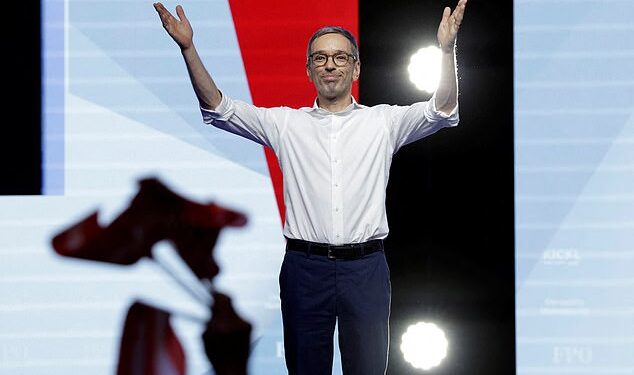Austria’s hard-right Freedom Party (FPOe) is poised to win this week’s election, with its firebrand leader courting votes by pledging to close the borders and end support for Ukraine.
Herbert Kickl, 55, has vowed to transform the country into ‘Fortress Austria’, slamming the current government’s ‘failed migration policy’ as being to blame for the Islamist terror plot on a Taylor Swift concert.
He and his party have promoted ‘remigration’, the controversial concept which promotes the expulsion of immigrants of non-European ethnic backgrounds who are deemed to have failed to integrate.
He is also seen by critics as being soft on Vladimir Putin, and has repeatedly called for an end to Austrian support for Ukraine, arguing that the country should remain neutral.
A fan of Viktor Orban, Hungary‘s pro-Putin president, he has accused the EU of ‘warmongering’ and said that if he becomes chancellor he would veto sanctions against Russia.
A victory for the FPOe in Sunday’s election would mark the first time a hard-right party has won a parliamentary vote in Austria since the fall of the Third Reich.

Freedom Party leader Herbert Kickl has vowed to transform the country into ‘Fortress Austria’
The FPOe was founded in 1956 as an alternative to Austria’s two main parties, and its first two leaders were both former Nazis and high-ranking SS officers.
It later became an established part of Austria’s political landscape and its takeover by populist Jorg Haider saw it begin to appeal to voters with its anti-immigration message.
Under Kickl, the FPOe has rapidly gained support and is now likely to get into power as the senior partner in a new coalition with the conservative Austrian People’s Party (OVP).
Since he took charge of the party in 2021, it has risen in the polls to about 27 percent – sharply up from 18 percent three years ago.
The populist leader was previously a behind-the-scenes operator in the party, helping to repackage it in the 1990s and get it into government in Vienna in 2000.
Buoyed by discontent over soaring inflation, Kickl has profited from the plummeting popularity of the ruling coalition of conservatives and Greens.
In June’s European elections the FPOe topped the poll for the first time nationally, taking more than a quarter of the vote.
A professional politician, Kickl studied philosophy, history, communication and political science before starting to work for the FPOe in 1995.

The FPOe is likely to get into power as the senior partner in a new coalition with the conservative Austrian People’s Party (OVP). Pictured: Head of People’s Party (OEVP) and Austrian Chancellor Karl Nehammer

Since Kickl (centre) took charge of the party in 2021, it has risen in the polls to about 27 percent
But little is known about his private life and he has maintained a low profile, with voters warming to his tidy and trustworthy demeanour, in contrast to his flamboyant predecessors.
But his bland, unassuming image contrasts with his virulent rhetoric, which he expertly employs against political opponents, slamming President Alexander Van der Bellen as a ‘senile mummy’.
‘He is the rudest politician in the country,’ journalist Nina Horaczek, who analysed Kickl’s speeches in a book published this year.
‘It’s a way of discrediting those who think differently,’ she added.

Visitors queue up to enter the Parliament building in Vienna, Austria, September 23, 2024
However, Kickl has also avoided debates and interviews, denouncing the media for their ‘lack of objectivity’.
He declined AFP’s request for an interview.
Instead he has relied on social media. The FPOe sparked fury last year with a video espousing an extremist conspiracy theory that white Europeans are being replaced by migrants.
It also featured the Vienna balcony where Adolf Hitler gave his speech when he returned to his homeland in triumph after the Nazis annexed Austria in 1938.
The FPOe was founded by former Nazis, and Kickl has frequently employed terms reminiscent of the party’s troubled past, including calling himself the future ‘Volkskanzler’ – the people’s chancellor – as Hitler was termed in the 1930s.
‘It’s a well targeted provocation with two aims – to get people talking and to send very clear signals’ to the party’s most radical fringes, said Horaczek.
Kickl denies ‘Volkskanzler’ is a Nazi reference, insisting that several politicians had claimed the term for themselves in the past.
But the far-right leader has never made a secret of his closeness to extremist groups, expressing his support for the Identitarian Movement as early as 2016.
He has also espoused the far-right concept of ‘remigration’ that calls for expelling people of non-European ethnic backgrounds deemed to have failed to integrate.
In 2018 during his time as interior minister, Kickl oversaw a controversial raid on the country’s secret service, where documents on the links between the FPOe and extremist circles were seized.
And in April, prosecutors launched a corruption investigation against him amid claims that public money was embezzled to pay for adverts in return for alleged favourable coverage.
Last year, Kickl appeared on posters in his home region of Carinthia, dressed in a green parka jacket with military overtones alongside the slogan: ‘Fortress Austria – closing borders, guaranteeing security.’
For the upcoming national elections, he has changed into a suit, but has kept the slogan.







